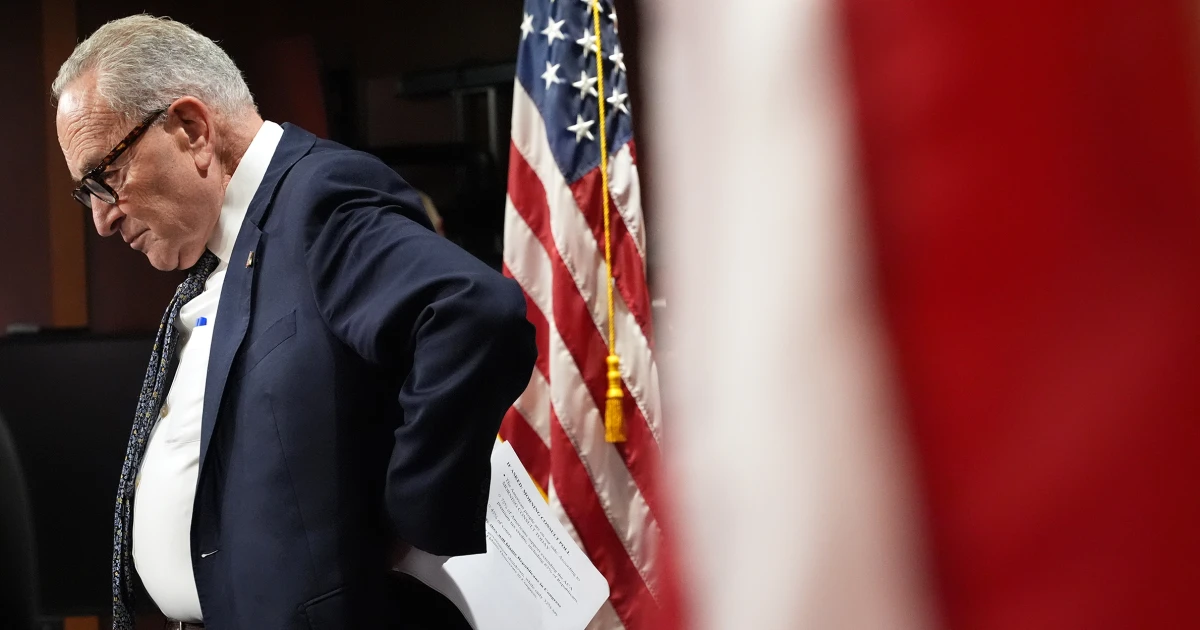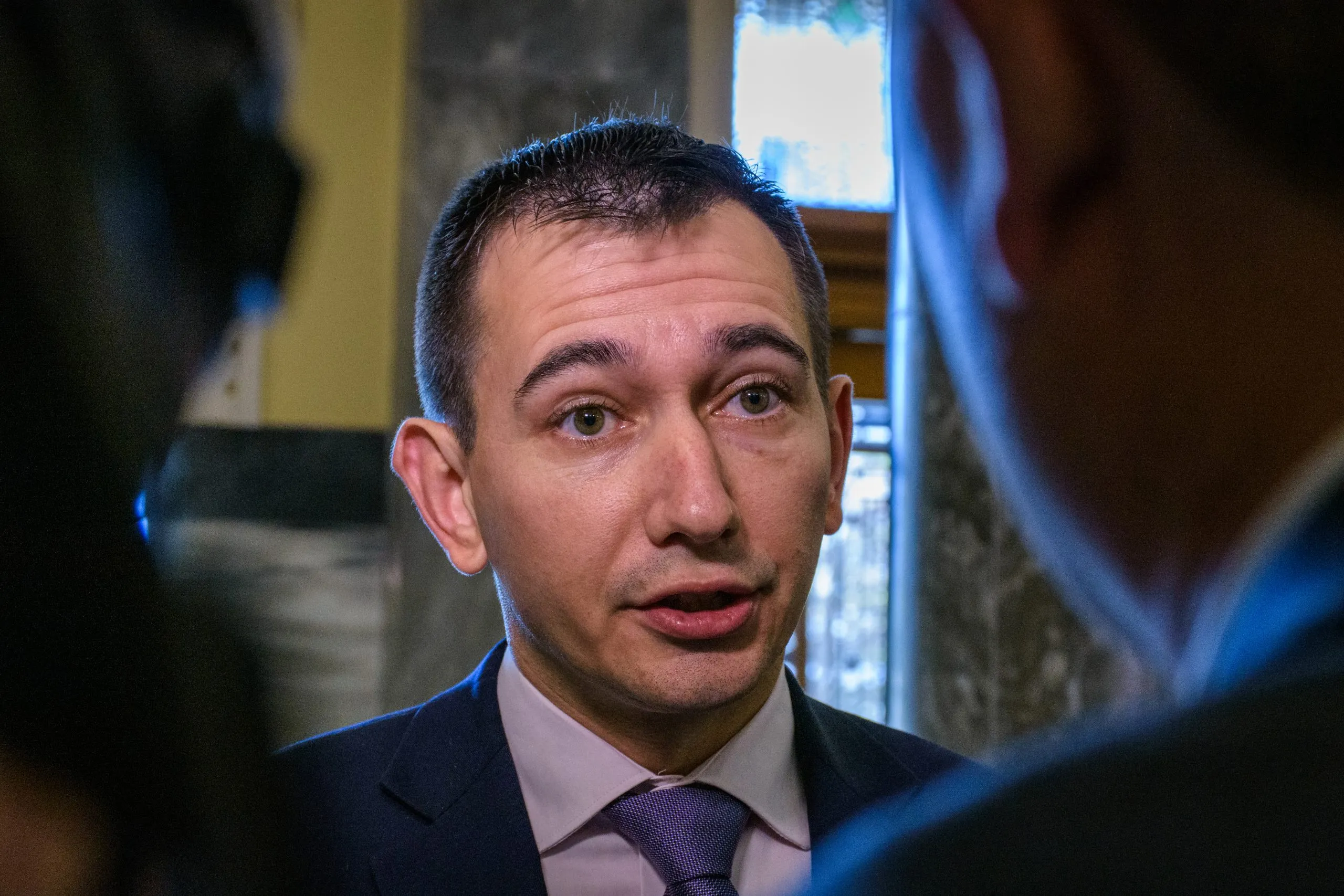
The government is now in its first shutdown since 2019 — and there is little sign that either party will soon give in to the other side’s demands and turn the lights back on.
That isn’t to say there’s no sign some Democrats want to cave, however.
Hours before the midnight funding deadline, Senate Republicans blocked a spending proposal from Democrats, 47-53, that would have funded the government and extended subsidies for Affordable Care Act health care plans, giving people on the Obamacare exchanges the certainty that Democrats say they need ahead of open enrollment in November.
Democrats answered by blocking the GOP’s bill, depriving the House-passed legislation of the 60 votes it needs to advance in the Senate.
Still, not every Democrat was on board with leadership’s strategy of blocking the bill.
Three senators who caucus with the Democrats voted with Republicans on the GOP funding measure, bringing the final tally to 55-45 on Tuesday night — short of the 60-vote threshold, but enough to show an early division in the party as the government enters a shutdown.
The trio of Democrats who voted with Republicans weren’t a complete surprise. Sen. Angus King of Maine, an independent who caucuses with Democrats, has sounded undecided on the Democratic strategy. He suggested to CNN on Tuesday that he was concerned with the ramifications of shutting down the government.
“But I’m also concerned about the ramifications of one-sided government,” King said, an apparent reference to the partisan way Republicans have gone about drafting their spending proposal.
King said he voted to keep the government open “because a shutdown will give President Trump the ability to do far greater damage.”
Sen. John Fetterman, D-Pa., who said Tuesday that he wouldn’t vote for “the chaos of shuttering our government,” has been clear all along that he disapproves of any strategy that uses a shutdown as a bargaining chip.
His suggestion to his Democratic colleagues who want to change health care policies was simple: “Win elections.”
Sen. Catherine Cortez Masto of Nevada, perhaps the biggest surprise among the Democratic dissenters, joined King and Fetterman in supporting the GOP proposal. After the vote, she told reporters she wanted to avoid “a costly shutdown that would harm Nevada and hand power to a reckless administration.”
“We should be working on bipartisan solutions to address a living health care crisis,” Cortez Masto said, referring to the oncoming increase to Obamacare premiums. “But that doesn’t mean we should be swapping harm to one group of Americans from that.”
While other Senate Democrats voted against the GOP’s spending bill Tuesday night, several other Democrats could quickly grow uncomfortable with their party’s strategy as the shutdown drags on.
Ten Senate Democrats voted to advance a similar GOP spending bill in March — including Minority Leader Chuck Schumer of New York — and there was a group of Democrats on the Senate floor Tuesday night who spent a considerable amount of time talking with one another before they ultimately voted against the Republican bill.
They included Chris Coons of Delaware, Ruben Gallego of Arizona, Kirsten Gillibrand of New York and Maggie Hassan and Jeanne Shaheen, both of New Hampshire. Gillibrand, Hassan and Shaheen were among the 10 Democrats who voted to advance the GOP bill in March, and all three sounded less than definitive ahead of the vote Tuesday.
Meanwhile, President Donald Trump and Republicans have shown no sign of changing their position. They insist Democrats need to support the House-passed continuing resolution before they will negotiate on extending Obamacare subsidies.
Trump suggested Tuesday that Democrats should fear what he and his administration could do during a shutdown.
“We can do things during the shutdown that are irreversible, that are bad for them,” Trump said, mentioning that he could cut government workers and programs that Democrats like.
But, for now, Schumer is expressing confidence in the Democratic strategy.
Asked Tuesday night whether he was concerned about three members of his Democratic caucus joining Republicans to support the GOP spending bill, Schumer demurred.
“I’m concerned about Americans’ health care,” he said. “That’s what we Democrats are concerned about.”
He noted the significant increases coming to health care premiums, and he said Democrats feel they’re representing their constituents “in the best way possible.” And asked whether he could guarantee that more Democrats wouldn’t join the trio in supporting the GOP’s bill, he sidestepped the question.
“Look, the bottom line is, as I said, our guarantee is to the American people that we’re going to fight as hard as we can for their health care, plain and simple,” he told reporters.
But one difficulty for Democrats is that their issue with the GOP bill is less what’s in the measure and more what’s not included.
Democrats have a number of health care-related demands, from unlikely asks like rolling back Medicaid cuts in the GOP’s reconciliation bill to more feasible requests like extending Affordable Care Act tax credits that are set to expire at the end of the year. If those tax credits aren’t extended, millions of people’s premiums will spike — by more than 75% on average for enrollees, according to the Kaiser Family Foundation.
The GOP-crafted bill included neither of those requests. Republicans, several of whom want to extend the Obamacare subsidies, have said they will address the looming cliff later in the year, separate from government funding negotiations. House Speaker Mike Johnson, R-La., for example, has said the matter is “a December policy issue, not a September funding issue.”
Democrats, however, are refusing to delay the conversation, worried that Americans will elect to not get health care when open enrollment begins on Nov. 1.
While some Senate Democrats peeled off Tuesday, the majority of members in the party are standing squarely behind leadership’s strategy — at least for now.
“There’s 66 of the 91 pages that deal with health care issues. Sixty-seven of the 91 pages deal with health care. Health care, the cost of health care, is paramount,” Rep. Rosa DeLauro of Connecticut, the top Democrat on the House Appropriations Committee, said when MSNBC asked whether she is comfortable going down the road of a shutdown over something not in the funding bill.
“It’s about people being able to afford health care in this nation,” she said. “We got premiums going up in a matter of weeks. People can’t afford it. Come to the table; let’s negotiate. I’ve had the pleasure of doing that for a number of years with my Republican colleagues. It can get done again.”



